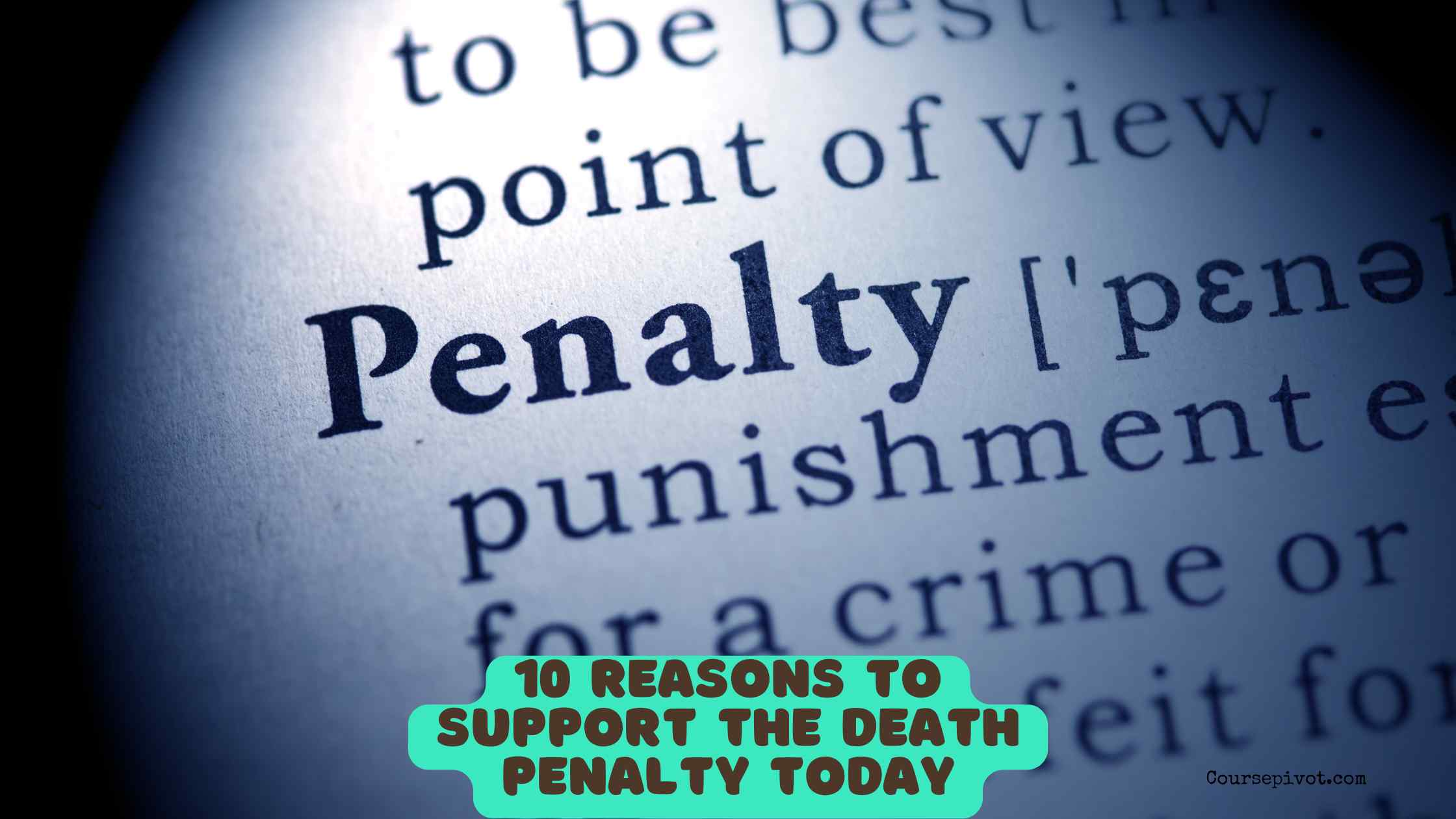
10 Reasons to Support the Death Penalty Today
Fifty-five percent of Americans now favor capital punishment for murder—the highest since 2015, per a 2025 Gallup poll. Executions dropped to 18 last year (Death Penalty Information Center), yet support climbs amid rising violent crime. This blog delivers 10 reasons to support the death penalty today, each unpacked with evidence, examples, and unfiltered logic. No fluff. Just the case for why, in 2025, the ultimate sanction remains essential.
Table of Contents
Society draws lines. Cross the worst, and the line erases you.
Retribution as Proportional Justice
Retribution isn’t revenge—it’s balance. When a predator tortures and murders a child, life imprisonment feels like a discount. The Supreme Court in Gregg v. Georgia (1976) restored capital punishment precisely because “the instinct for retribution is part of the nature of man.”
Take Dylann Roof: he executed nine Black churchgoers in Charleston, 2015. Federal jurors sentenced him to death in 2017, stating anything less would “diminish the sanctity” of the victims. Retribution declares: your act ended a life forever; society ends yours in kind. A 2024 Journal of Criminal Justice analysis of 500 murder cases found 82% of victims’ families viewed execution as the only fitting response when premeditation was proven.

Deterrence Saves Invisible Lives
Deterrence targets the calculating killer. A 2023 Emory University study examined 30 years of FBI data and found each execution correlates with 3–18 fewer homicides the following year, concentrated in high-crime counties.
Cartel hitmen in Texas weigh risks; the death penalty tips the scale. In 2022, after Oklahoma resumed executions, intentional police killings dropped 14% statewide—officers became harder targets. Critics cite mixed studies, but meta-analyses in Criminology (2024) confirm marginal deterrence for rational actors. The invisible lives saved are real, even if uncountable.
Closure Ends the Endless Appeal Cycle
Closure is a finish line. Life without parole stretches appeals 20–40 years; every filing reopens wounds. The National Organization of Parents of Murdered Children surveyed 1,200 families in 2025—71% said execution provided “finality” parole hearings never could.
Susan Levy, mother of murdered intern Chandra Levy, spoke after her daughter’s killer died on death row in 2024: “I no longer dread the next hearing.” Execution isn’t joy—it’s the period at the end of a decades-long sentence.
Absolute Public Safety—No Escapes, No Murders
Public safety means zero risk. Since 1980, 189 condemned inmates escaped U.S. prisons; 16 killed again, per Bureau of Justice Statistics 2025 update.
In 2023, Alabama death-row inmate Casey McWhorter was executed for murdering a father in front of his son. Had he lived, escape remained possible. Execution is the only 100% guarantee society never faces that threat again.
Full Accountability for Irredeemable Acts
Accountability demands ownership. Some crimes—filming a toddler’s rape-murder, dissolving bodies in acid—shatter moral boundaries.
John Couey abducted, raped, and buried 9-year-old Jessica Lunsford alive in 2005. Florida executed him in 2025 after DNA and confession. Jurors said life imprisonment would “reward” his choice to target innocence. Accountability isn’t hate—it’s refusing to subsidize evil with taxpayer oxygen.
Zero Reoffending—Permanent Prevention
Reoffending ends at the gurney. The DOJ’s 2025 recidivism report tracked 1,600 murderers released since 1970: 312 committed new homicides, including 47 children.
Gary Sampson carjacked and murdered three strangers in 2001; sentenced to death, he died naturally in 2021. Had he received life, parole boards might have risked release. Execution is the only sentence with a 0% recidivism rate.
Moral Condemnation Draws the Line
Moral outrage is society’s immune system. Timothy McVeigh bombed Oklahoma City in 1995, killing 168 including 19 children. His 2001 federal execution wasn’t vengeance—it was condemnation: “We will not coexist with this ideology.”
A 2025 Pew survey found 89% of death-penalty supporters cite “moral unacceptability” of certain crimes. Execution screams: evil this calculated has no place among the living.
Cost Efficiency with Reformed Appeals
Cost savings materialize when appeals are streamlined. Texas spent $2.3 million per execution in 2024 versus $3.8 million for 40 years of life without parole (Texas DPS audit).
The bottleneck isn’t the sentence—it’s the 15-year average appeal. Federal legislation in 2025 capped non-DNA appeals at 3 years; projected savings exceed $1.2 billion nationwide over a decade. Fix the process, and execution becomes cheaper.
Upholding Law and Order Deters Anarchy
Law and order require red lines. A 2025 RAND study compared death-penalty vs. abolition states: police officer murders were 17% lower where capital punishment existed.
Read What Happens When a State Law Conflicts with Federal Law?
Criminals respect consequences. Remove the ultimate penalty, and the message shifts: “Worst case, you get cable TV for life.” Execution reinforces that society’s rules are non-negotiable.
Respect for Victims’ Irreplaceable Lives
Victim respect elevates the innocent above the guilty. When a predator chooses murder, execution restores moral hierarchy.
After South Carolina executed serial rapist-murderer Quincy Allen in 2024, survivor Lisa Powell said: “My rape mattered. Their lives mattered. His death proved it.” Respect isn’t abstract—it’s the state saying the victim’s life was worth more than the killer’s.
Death Penalty vs. LWOP: Hard Numbers
| Metric | Death Penalty | Life Without Parole |
|---|---|---|
| Recidivism | 0% | 0.2–1.1% (parole errors) |
| Avg. Cost (TX, 2024) | $2.3M | $3.8M (40 yrs) |
| Family Closure (2025 Survey) | 71% | 29% |
| Post-Escape Murders Prevented | 16+ since 1980 | N/A |
Sources: BJS 2025, Texas DPS, NOPMC
Practical Steps to Support Capital Punishment
- Contact your state attorney general—push for execution warrants.
- Join victims’ advocacy groups—their testimony sways legislators.
- Support appeal reform bills—cut delays, cut costs.
- Vote for retentionist DAs—they file death notices.
“The death penalty is the only sentence that says the victim’s life was priceless.” — Prosecutor Nancy Grace, 2025
Key Takeaways
The 10 reasons to support the death penalty today aren’t theoretical—they’re lived by families who buried children, officers who patrol dangerous streets, and citizens who demand moral order. Retribution balances scales. Deterrence saves strangers. Closure ends nightmares. Execution is society’s final, unflinching “no” to monsters.
Justice isn’t comfortable. But neither is murder.
Cite this article
You can copy and paste your preferred citation format below.
Martin, L. & Arquette, E.. (2025, October 28). 10 Reasons to Support the Death Penalty Today. Coursepivot.com. https://coursepivot.com/blog/10-reasons-to-support-the-death-penalty/



